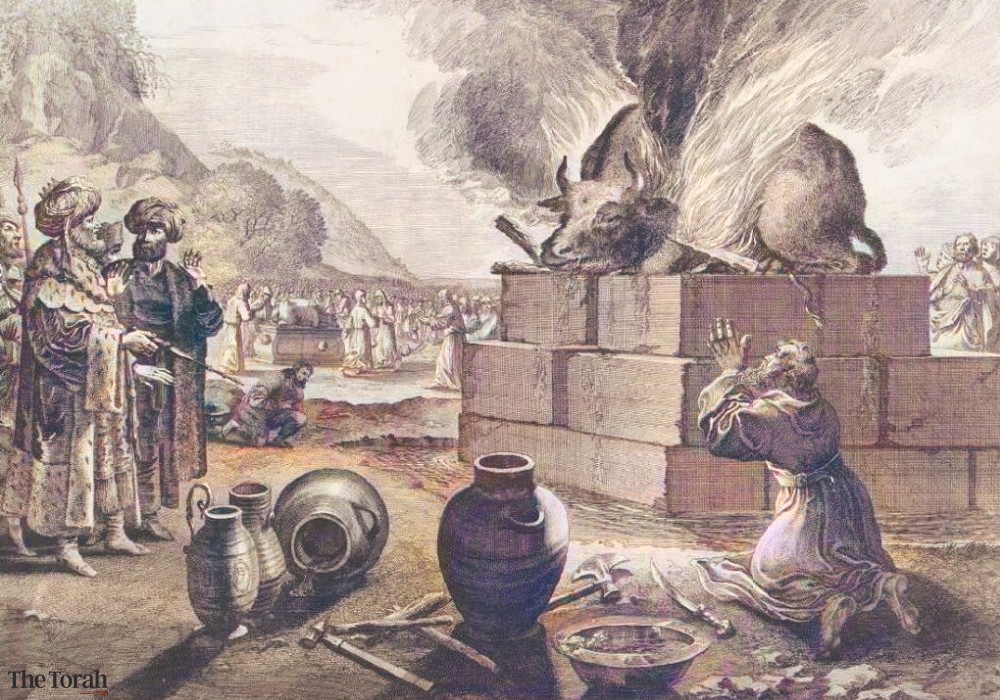This week we are reading about the Contest on Mount Carmel between Elijah and the 450 prophets of Baal. Please read and re-read 1 Kings 18. As you read through the story pay particular attention to when God instructs Elijah to act, and when Elijah appears to act on his own.
The Setting: (1 Kings 18:1-6)
When we left Elijah last week, he was still in Zarephath with the widow and her son. The widow has confessed to Elijah that he is a man of God. The drought proclaimed by Elijah in 1 Kings 17:1 is still ongoing.
Our story this week opens with God telling Elijah to once more go to King Ahab. This time, however, he is to declare that the drought is over. 1 Kings 18:1. This is the only instance in the readings this week that the “word of the Lord” comes to Elijah.
Obediah: (1 Kings 18:7-16)
On his way to meet Ahab, Elijah runs into Obediah, who is the head of Ahab’s household. (The name Obediah simply means “servant of Yahweh” and is the name of at least nine other men in the Old Testament.) Obediah informs Elijah that Jezebel killed off all of the Lord’s prophets except for one hundred of whom Obediah had hidden in a cave. Since Jezebel could not find Elijah, the bringer of the drought, she took out her anger on his fellow prophets.
We can see how this encounter changes the entire course of our story. God simply tells Elijah to pronounce the end of the drought which would demonstrate God’s sovereignty over nature and over Israel. Elijah takes it one step further.
Encounter with Ahab: (1 Kings 18:17-19)
Obediah sets up the meeting between Ahab and Elijah. Ahab greets Elijah by proclaiming him the “troubler of Israel.” Ahab blames Elijah for causing the drought and for causing the dissension in his household between his wife and the prophets of his God. Elijah does not allow Ahab to cast away the blame. Elijah retorts to Ahab that it is Ahab and his apostasy that has caused the misfortune. Elijah then challenges Ahab to a prophetic battle of the Gods on Mount Carmel.
Mount Carmel: (1 Kings 18:20-22)
Mount Carmel is a verdant promontory that juts out into the Mediterranean. The Kishon River that flows along the base of Mount Carmel was the general border between Israel and Tyre. The contest between the prophet of the God of Israel and the prophets of the God of Tyre and Sidon is going to take place where everyone can witness. As instructed by Elijah, Ahab gathers all of Israel and the 450 prophets of Baal (that Jezebel brought with her from Tyre) on the mountain. Elijah berates his fellow Israelites for following both Baal and Yahweh and waffling over who their true God is. Against these 450 prophets stands only Elijah, since, as he (mistakenly) states, is the only prophet of Yahweh that is left.
The Contest: (1 Kings 18:23-39)
Elijah sets the rules of the contest. Each side will be given a bull to prepare for a sacrifice. Each side will prepare their altar with firewood to make the sacrifice. However, neither side can light their respective sacrifice but must pray to their respective deity for fire. (There are commemorative t-shirts available for purchase for this battle.)
Elijah allows the Baal prophets to go first. They prepare the bull and their altar for the sacrifice. All morning they cry out to their god. They danced and cut themselves to get their god’s attention, but nothing occurred. Elijah mocks these prophets, telling them that they should yell louder since their god is apparently sleeping or defecating. Nothing happens to the Baal sacrifice.
Elijah then prepares his own sacrifice. He rebuilds the altar to Yahweh that Ahab had destroyed, prepares the bull and the firewood, and digs a trench around it all. He then instructs the people to pour water on the altar three times using four jars (3×4=12) until the trench itself fills with water. Elijah then demands that Yahweh light the sacrifice. He calls on God to answer him. God obliges, and fire rains from heaven. God’s fire consumes not only the wet beast, but the wood, the stones of the altar, the water in the trench, and the dust itself.
Pay-Back: (1 Kings 18:40)
Immediately upon securing his victory, Elijah exacts his revenge. Having shown that this God is the true God of Israel, he leads the Israelite people to slaughter the 450 prophets of Baal. In his ruthless zeal, Elijah eliminates the competition.
Rain: (1 Kings 18:41-46)
Having avenged Jezebel’s slaughter of his companion prophets, Elijah now continues with his divine mission of ending the drought. He withdraws alone with his servant to the top of Mount Carmel, crouches to the ground in a fetal position, and prays in silence for the rains to come. He sends his servant out seven times to look for the gathering clouds.
Once the clouds are spotted, Elijah sends his servant to Ahab to announce the end of the drought. The servant tells Ahab to mount his chariot and descend the mountain before the rains make the road impassible. Ahab begins his descent in his chariot. Empowered by the divine spirit, Elijah sprints triumphantly in the pouring rain ahead of Ahab’s chariot to the royal palace in Jezreel.
Dinner is at 6. The menu is savory waffles. Discussion about 6:45. Hope to see you here!
For zeal for thy house has consumed me,
Psalm 69:9,22-24
and the insults of those who insult thee have fallen on me.
Let their own table before them become a snare;
let their sacrificial feasts be a trap.
Let their eyes be darkened, so that they cannot see;
and make their loins tremble continually.
Pour out thy indignation upon them,
and let thy burning anger overtake them.


Pingback: Elijah – The Journey to Horeb (1 Kings 19), pt.1 – Ancient Anglican